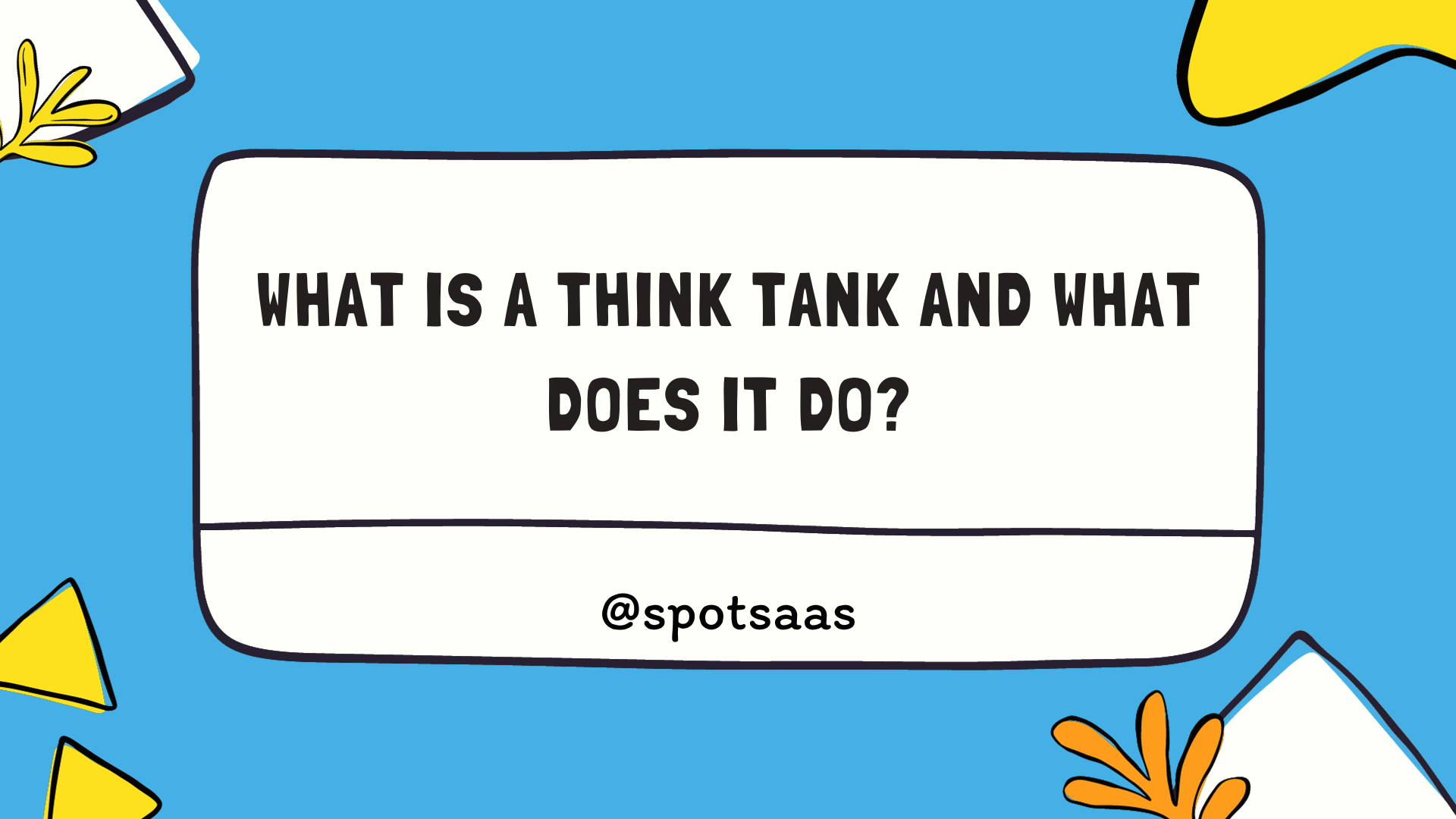Ever found yourself pondering over what goes on behind the scenes in policy-making? You’re certainly not alone! I too shared that curiosity until I stumbled upon an intriguing world of ‘think tanks’.
In this article, we’re going to dig deep into these mysterious organizations and explore their powerful sway over global policy creation.
Key Takeaways
- These are research organizations that conduct policy-oriented studies to shape public opinion and influence social and political strategies.
- There are different types of think tanks, including academic institutes, advocacy groups, contract research organizations, and transnational organizations.
- These do work by conducting research and analysis on various policy issues, influencing public opinion, engaging with government policymakers, and shaping national and global policy agendas.
What Is a Think Tank?
A think tank is a research institute or organization that conducts policy-oriented research and analysis, often with the goal of influencing public opinion and shaping social and political strategies.
Definition and history
The concept of think tanks traces back to the early 20th century, but they gained significant prominence during World War II. These entities started as research organizations with an aim to address complex military strategies.
Over time, their focus expanded beyond war-related matters into almost every aspect of public policy – such as economics, social issues and environmental regulations. Think tanks emerged as independent institutions specializing in policy-oriented studies that could help governments make informed decisions based on evidence and expert analysis.
While most are non-profit by nature, there exist a variety funded either privately or through government grants. This history has shaped today’s global network of think tanks that continue to influence public policies with robust research and advocacy efforts.
Types of think tanks
It’s important to understand the diverse range of think tanks that exist. They’re not all built the same and each has its unique purpose and focus. Here are some distinct types:
| Type of Organization | Description |
|---|---|
| Academic or Research Institutes | Conduct in-depth studies on various areas like economics or the environment. |
| Advocacy Tanks | Champion specific causes or policies via detailed research. |
| Contract Research Organizations | Conduct research for other organizations, such as government bodies or businesses. |
| Trans-national Think Tanks | Focus on policy matters beyond one nation’s borders. |
| Party Think Tanks | Develop and promote policies that align with a political party’s ideology. |
| Quasi-Governmental Institutions | Independently operate but often receive funding from government sources. |
| Independent Think Tanks | Cover a wide array of public policy issues without formal ties to governments or parties. |
Global think tanks
Global think tanks play a crucial role in shaping public policies and influencing international decisions. They conduct extensive research on global issues, such as climate change, international relations, and economic development.
Not confined by national borders or individual government policies, these provide an unbiased platform for research and analysis that reflects a wide spectrum of perspectives.
Many collaborate with agencies across continents to generate comprehensive insights about pressing global concerns. Through publishing policy-oriented research documents, and hosting seminars and conferences worldwide, they educate the public while informing leaders at the same time.
Private donations, corporate sponsorships and sometimes government grants fund their meaningful work ensuring independence from narrow partisan interests.
How Do Think Tanks Work?
They work by conducting research and advocacy to provide analysis and recommendations on social policy, political strategy, and public policy research. They influence public opinion and engage with government policymakers to shape national and global policy agendas.
Conducting research and advocacy
They play a crucial role in conducting research and advocacy on various policy issues. As independent organizations, they gather experts who analyze social policies, political strategies, and global trends.
These experts engage in thorough research to provide evidence-based recommendations that can shape public opinion and influence government policies. By collaborating with government agencies, academic institutions, and businesses, these groups gather information from diverse sources to gain comprehensive insights into complex issues.
Through their research findings and reports, they contribute to public education by organizing conferences and publishing articles that help inform the general population about important policy matters.
Influence on public opinion
These group have a significant influence on public opinion. Through their research, reports, and policy recommendations, they shape the way people think about various issues. By providing evidence-based information and expert analysis, they work to persuade the public and policymakers to consider certain positions or solutions.
Their engagement in public outreach activities such as conferences, seminars, and article publications also helps to raise awareness and educate the public on important topics. With collaborations with government agencies, businesses, and academic institutions, think tanks are able to gather information and expertise that further strengthens their influence on public opinion.
Transcontinental think tanks
Transcontinental think tanks are organizations that operate across multiple regions or continents, conducting research and analysis on global policy issues. These think tanks focus on topics of international significance, such as trade, diplomacy, security, and global development.
They collaborate with experts and researchers from different countries to provide insights and recommendations that can shape policies at a regional or global level. Transcontinental think tanks play a crucial role in fostering international cooperation and addressing complex challenges that require cross-border collaboration.
What Does a Job in a Think Tank Involve?
A job in a think tank involves conducting research, analyzing social and political policies, and advocating for specific issues. Interested to know more about the required skills and potential impact of working in a think tank? Keep reading!
Required skills and experience
To work in a think tank, it is essential to have strong research and analytical skills. This includes the ability to gather and evaluate information, conduct in-depth analysis, and formulate evidence-based recommendations.
Excellent communication skills are also crucial as you will need to effectively convey complex ideas through reports, presentations, and policy briefs. Furthermore, critical thinking and problem-solving abilities are highly valued in this profession.
A background in social sciences or public policy is often preferred, along with a solid understanding of political strategies and social issues.
Entry points and job opportunities
There are various entry points and job opportunities available in the field of think tanks. Some of these include:
| Position | Description |
|---|---|
| Researcher | Conduct research, analyze data, and write reports to support policy recommendations. |
| Policy Analyst | Evaluate and provide insights on public policies, recommending potential impacts. |
| Communications Specialist | Communicate research findings through various channels like press releases and social media. |
| Project Manager | Manage projects, overseeing their planning, implementation, and monitoring. |
| Fundraising and Development Officer | Identify donors, write grant proposals, and build relationships to support initiatives. |
| Policy Advisor | Provide expert policy advice to policymakers based on research findings. |
Potential for impact
Working in a think tank offers the potential to have a significant impact on policy and decision-making. As researchers and experts, we have the opportunity to conduct rigorous analysis, provide evidence-based recommendations, and influence public opinion.
Our work can shape local, regional, or global policies by informing policymakers about the implications of various options. By engaging with government agencies and other stakeholders, we can contribute to meaningful discussions on social policy, political strategy, and economic issues.
Through our research findings and advocacy efforts, we aim to make a positive difference in society by addressing pressing challenges and driving change in areas that matter most.
Upsides and Downsides of Working in a Think Tank
Working in a think tank can offer personal fulfilment and job satisfaction, as it allows individuals to make meaningful contributions to important policy discussions and social change.
Personal fit and job satisfaction
Working in a think tank can offer immense personal fit and job satisfaction. The opportunity to contribute to important social policy issues and political strategies is highly rewarding.
Researchers get to read, write, and discuss topics that align with their interests and expertise. Being part of an organization that values research, analysis, and informed decision-making brings a sense of importance and purpose to the work.
Additionally, the collaborative nature of these groups allows for engaging discussions with experts from various fields. Overall, working in a think tank provides an intellectually stimulating environment where ideas are exchanged freely, making it an ideal profession for those passionate about making a positive impact on society.
Read about – 21 Self Appraisal Comments for performance review.
Salaries and policy influence
The diversity within these organizations allows for a wide range of salary options, often commensurate with one’s experience and the organization’s funding. In parallel, the ability to sway policies forms an integral part of job satisfaction for many think tank professionals.
| Area | The ability to influence policy is a significant draw for many professionals working. Using their research and analysis, they can shape and inform public policies, legislation, and public opinion. This influence can often serve as a powerful motivator, providing a sense of fulfilment and purpose beyond the financial remuneration. |
|---|---|
| Salaries | Salaries can vary significantly based on several factors such as the nature of the organization (independent, nonprofit, or for-profit), its funding, and the professional’s role and experience. It’s an important factor to consider for potential employees, as the financial return can range from modest stipends for junior researchers to substantial six-figure salaries for high-ranking positions. |
| Policy Influence | The ability to influence policy is a significant draw for many professionals working. Using their research and analysis, they can shape and inform public policies, legislation, and public opinion. This influence can often serve as a powerful motivator, providing a sense of fulfillment and purpose beyond the financial remuneration. |
Remember, when it comes to deciding on a career in a think tank, it’s essential to weigh both the potential earnings and the opportunity to make a real impact on important policy issues.
Thought you might want to read about Resource management - Detailed Guide (2023)
Career progression and opportunities for growth.
Working in a think tank offers exciting career progression and numerous opportunities for growth. As a researcher or expert, you can start at an entry-level position where you learn to conduct research, analyze data, and contribute to policy recommendations.
With time and experience, you can advance to more senior roles where you lead projects, manage teams, and have greater influence on decision-making processes. These groups also provide opportunities for professional development through conferences, training programs, and networking events.
Additionally, as think tanks work with government agencies and academic institutions, there are possibilities for collaborations that can further enhance your expertise and expand your network.
Conclusion
Think tanks are organizations that conduct research and analysis on various policy issues. They aim to provide objective and evidence-based information to influence policymakers and public opinion.
FAQs
1. What is a think tank?
A think tank is an organization that conducts research and analysis on various social, economic, and political issues.
2. What does a think tank do?
Think tanks gather experts to study specific topics and develop policy recommendations or solutions for government, businesses, or other organizations.
3. How does a think tank conduct research?
Think tanks use various methods such as data analysis, surveys, interviews, literature reviews, and collaboration with experts in the field to conduct their research.
4. Who funds think tanks?
Think tanks are typically funded by a combination of sources including foundations, private donors, corporations, governments, and individual contributions.
5. Why are think tanks important?
Think tanks provide valuable insights and expertise on complex issues facing society today. Their research helps policymakers make informed decisions and shapes public discourse on important topics.




